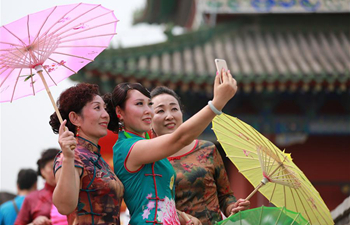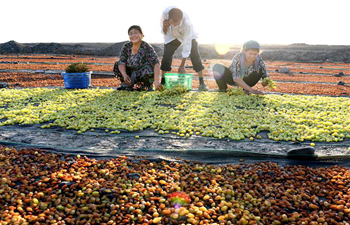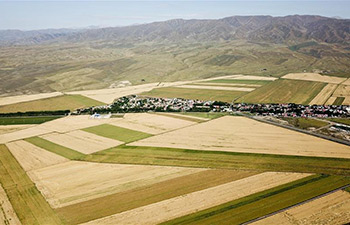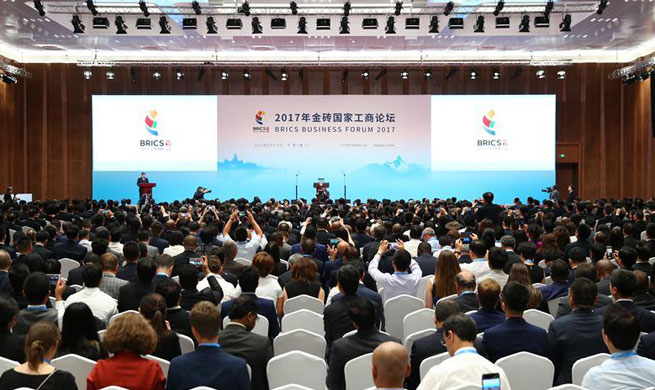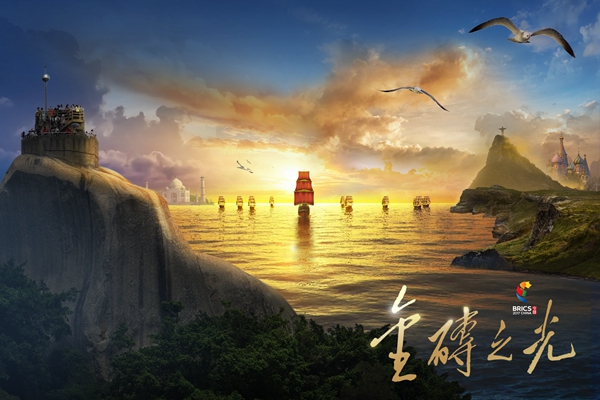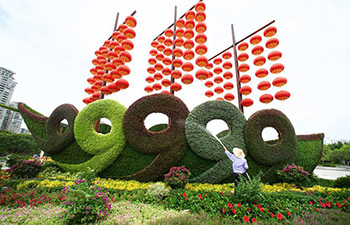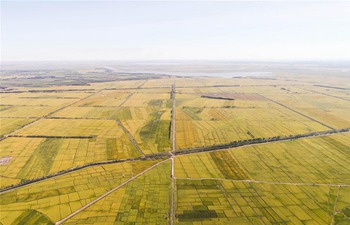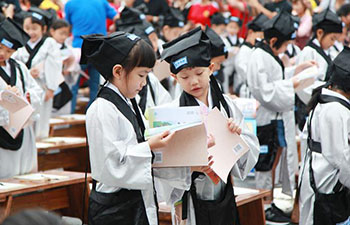TOKYO, Sept. 3 (Xinhua) -- "To pass on the war memories (to the younger generations) is the best way to preserve peace," said 64-year-old high-school history teacher Masami Yamada.
Yamada is engaged in a project of recording the oral history dictated by 92-year-old World War II veteran Nobuo Okimatsu.
"The war memories shall never be forgotten... We shall keep on thinking why Japan resorted to war in the past," said Yamada.
Yamada and Okimatsu planned to finish the recording in 10 sessions, and the first session took place just days before China marked the 72nd anniversary of victory in the Chinese People's War of Resistance Against Japanese Aggression on Sunday.
"I was born in the city of Kure, Hiroshima prefecture, and grew there until I was accepted into a preparatory school for the Imperial Japanese Army Academy," Okimatsu thus began his story, while Yamada wrote down every detail that Okimatsu dictated and put forward questions from time to time.
Okimatsu's life largely overlapped with the process that Japan slipped into the abyss of the invasive war. He entered primary school in 1931, the year when the Mukden Incident or September 18 Incident happened in China, a staged event engineered by Japanese military personnel as a pretext for the Japanese invasion of northeastern China.
"Though we were living in a military port city, we heard little about the incident at that time. People only knew that Japan was at war in a very far away place and our daily life was not influenced. Instead, the port city had a false prosperity because of the war," Okimatsu recalled.
"It was probably because of the social atmosphere at that time, wasn't it? People didn't realize that the war would bring devastating results, so public opinion was not against the war. But when the time came that people realized the consequences, they were already so deep in the war, right?" Yamada asked.
"Yes," Okimatsu replied.
In 1937, Okimatsu entered middle school. Though people still knew little about the Lugou Bridge Incident that took place in China that year and marked Japan's full invasion of China, militarist thoughts were prevailing.
"People took pride in becoming a soldier. I was also determined to go to the Imperial Japanese Army Academy," said Okimatsu.
The session lasted about two hours, during which Okimatsu described the Japanese society at that time as well as his own life experiences.
"I have been a teacher of history for 37 years. But to my surprise, the more I learn about the war history, the more things that I find I don't know," said Yamada, adding that education on war history in Japanese schools is insufficient.
He said that one of the reasons for him to start recording war veterans' memories is that he still regrets that he didn't ask his late father about his war experiences. His father was also a World War II veteran.
Meanwhile, Yamada is also concerned about the current situation in Japan.
"From lifting ban on collective self-defense right to forced passage of the controversial new security laws, to attempts to revise the pacifist Constitution... all these were because the war memories are fading. I think this is the biggest crisis," he said.
Okimatsu agrees with Yamada. He said that he started to tell his stories to people about 10 years ago, because he "felt again the danger of war, as the government is bringing Japan further and further down the road of becoming a country that could fight wars again."
"Starting an invasive war was foolish, and Japan was destined to lose," he commented on the invasive war Japan launched in the past.
He believes that it is an obligation for those who have experienced the war to promote Japan's friendship with its neighbors, especially with China, so as to eliminate the factors that could cause wars.
"We have to keep thinking about why Japan resorted to war in the past, and pass on the war memories to the younger generations," said Yamada, adding that he hopes to introduce the war history to his students.
"Only by facing squarely to that part of the history, can we prevent the war from happening again. This is the best way to preserve peace," said Yamada.





